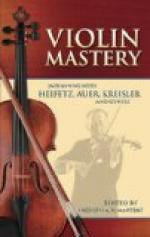GOOD AND BAD HANDS: MENTAL STUDY
“The influence of the physical conformation of bow hand and string hand on actual playing? There are no ‘good’ or ‘bad’ bow hands or string hands (unless they be deformed); there are only ‘good’ and ‘bad’ heads. By this I mean that the finest development of technic comes from the head, not from the hand. Quickness of thought and action is what distinguishes the easy player from the clumsy player. Students should develop mental study even of technical details—this, of course, in addition to the physical practice; for this mental study is of the highest importance in developing the student so that he can gain that effortless mastery of detail of which I have already spoken.
ADVANTAGE
AND DISADVANTAGE OF CONCERT
ATTENDANCE
FOR THE STUDENT
“Concerts undoubtedly have great value in developing the student technically and mentally; but too often they have a directly contrary effect. I think there is a very doubtful benefit to be derived from the present habit, as illustrated in New York, London, or other centers, of the student attending concerts, sometimes as many as two or three a day. This habit dwarfs the development of real appreciation, as the student, under these conditions, can little appreciate true works of art when he has crammed his head so full of truck, and worn out his faculties of concentration until listening to music becomes a mechanical mental process. The indiscriminate attending of concerts, to my mind, has an absolutely pernicious effect on the student.
NATIONALITY AS A FORMATIVE INFLUENCE
“Nationality and national feeling have a very real influence in the development of an artist; but this influence is felt subconsciously more than consciously, and it reacts more on the creative than on the interpretative artist. By this I mean that the interpretative artist, while reserving the right to his individual expression, should subject himself to what he considers to have been the artistic impulse, the artistic intentions of the composer. As to type music to whose appeal I as an American am susceptible, I confess to a very sympathetic reaction to the syncopated rhythms known as ‘rag-time,’ and which appear to be especially American in character.” For the benefit of those readers who may not chance to know it, Lieutenant Spalding’s “Alabama,” a Southern melody and dance in plantation style, for violin and piano, represents a very delightful creative exploitation of these rhythms. The writer makes mention of the fact since with regard to this and other of his own compositions Lieutenant Spalding would only state: “I felt that I had something to say and, therefore, tried to say it. Whether what I have to say is of any interest to others is not for me to judge.
PLAYING WHILE IN SERVICE




